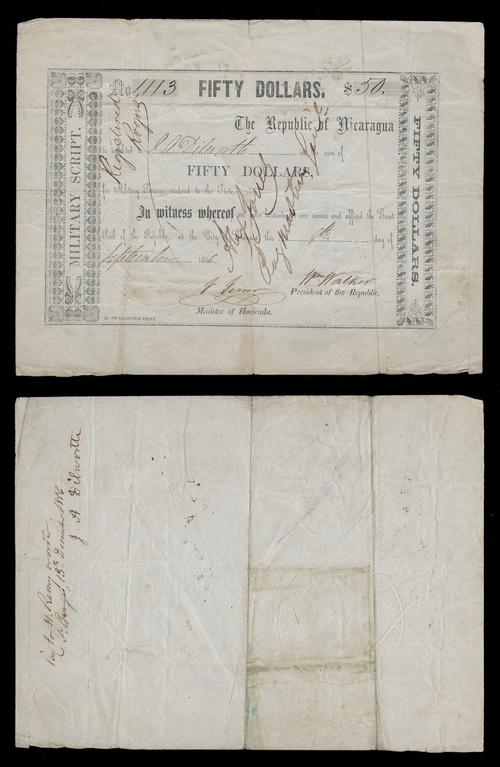
Auction: 339 - The Numismatic Collector's Series Sale at NY INC, Grand Hyatt
Lot: 1584
Nicaragua. Republic of Nicaragua. $50. September 9, 1856. S-132. No. 1,113. "MILITARY SCRIPT" in the left end panel. "FIFTY DOLLARS" at the top center. "…for Military Services rendered to the State" near the center. Signed by William Walker as President of the Republic. "Alex Jones / Pay Master Gen'l" is penned across the center. EL NICARAUGUENTE PRINT. Very Fine. Jumbo margins all around, with a short edge split at the top.
William Walker was one of the most colorful characters ever to sign a bank note. Born in Nashville, Tennessee in 1824, Walker grew up in an atmosphere that strongly influenced his deep support for the institution of slavery. He was passionate and hot tempered, intelligent and restless. Walker graduated from the University of Nashville and then studied medicine abroad. He returned to the U.S., earned a medical degree from the University of Pennsylvania at the tender age of nineteen, and then moved to New Orleans to study law. He soon gave that up, went into journalism, and became the editor of a San Francisco newspaper. His hot temper and willingness to freely express his opinions led to his involvement in three duels, one with notorious gunmen William Hicks Graham, who put two bullets into Walker before he could even fire a single shot.
In 1853, Walker conceived a plan to petition the Mexican Government for the right to create a fortified colony that would protect the U.S. from Indian raids. Mexico refused. Undeterred, he came up with a more grandiose scheme - create the independent Republic of Sonora, and later on, turn it into a state, as Texas did. He financed this scheme by "…selling scrips which were redeemable in lands of Sonora," then set out for Mexico with 43 men. It wasn't long before the Mexican government put an end to this ill-conceived adventure. He returned to California, was prosecuted for conducting an illegal war, and was acquitted.
In 1854, Walker's reputation as an adventurer resulted in an invitation by Nicaraguan president Francisco Castellon to serve as a mercenary in a war against rebels. This time Walker arrived with about 60 men, and was joined by 110 locals. He conquered Granada, set up a provisional president, and took control of the country. U.S. President Franklin Pierce recognized Walker's regime as the valid government of Nicaragua. Walker saw this as his first step toward establishing pro-slavery governments throughout Central and South America.
He quickly learned that establishing a government, and paying its expenses, were two different things. Income from selling licenses for retail business and the production of liquor were not enough. To pay military expenses he issued scrip notes, like the example in this sale. The first issues paid seven per cent interest, but later issues were emitted without interest.
Walker's actions drew the attention of Costa Rican President Mora, who was convinced his country would be next in line. Supported by Guatemala, Honduras, El Salvador and Cornelius Vanderbilt (whose rights to ship through Nicaragua were revoked by Walker), Mora defeated Walker and forced him back to the U.S.
Walker would not give up his dream of conquering Nicaragua. In 1860, while trying to reach Nicaragua again, he was captured by the British Navy and turned over to Honduran authorities. They promptly executed the 36-year-old firebrand.
We know of a only a few surviving pieces of Walker's military scrip, mostly in institutional hands. Very few have appeared in public sales. The last example we know of was Lot 1303 in Lyn Knight's June 13, 2014 Memphis Sale. That example realized $3,450, described as VG with multiple splits restored with backing. Our Very Fine example is vastly superior. Worthy of a significantly higher bid, it will become the centerpiece of any major North, South or Central American collection of paper money.
Sold for
$7,500




